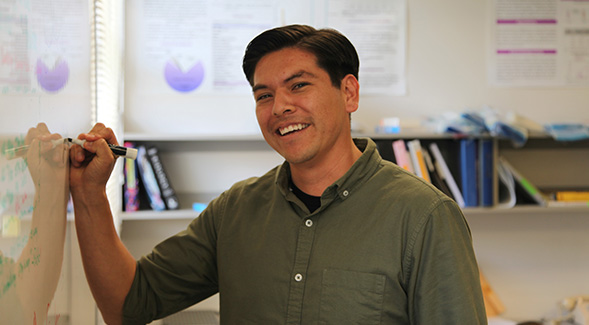Mysteries of the Microbiome Spark a Lifelong Passion
Pedro Torres authored 12 scientific papers while at SDSU, including one with positive implications for women's health.

Trillions of bacteria, viruses and fungi live inside each of us. Known collectively as the microbiome, these microbes play an essential role in our health and impact how our bodies respond to disease in ways scientists are still uncovering.
They were also critical in inspiring Pedro Torres to pursue a Ph.D. in the cell and molecular biology joint-doctoral program at San Diego State University and the University of California, San Diego.
The mysteries of the human microbiome—and the potential it holds for cures and interventions that might one day improve human health—unlocked a curiosity in Torres that has fueled his research for the past seven years and led to a major finding.
During his doctoral studies, Torres discovered the gut microbiome may be altered to improve symptoms of women suffering from polycystic ovary syndrome (PCOS), a common hormonal disorder that can lead to major health issues like high blood pressure, diabetes and heart disease.
Using a mouse model, Torres found that improving the health of the microbiome can mitigate testosterone imbalances that occur with PCOS, lessening symptoms like infertility and obesity.
This major finding was the subject of one of the 12 scientific papers Torres has co-authored while at SDSU, eight of them as first-author.
“It was pretty obvious from the beginning that he had a quality that academics and scientists really need: a mix of curiosity and motivation. This drive to want to know things,” said Scott Kelley, Torres’ faculty mentor in the biology department.
That drive helped Torres’ expand his specialization in biology to include bioinformatics as well as the microbiome. To learn bioinformatics, Torres took supplemental classes in advanced statistics and taught himself computer programming. He eventually became a go-to resource in the lab when fellow students needed help with coding or visualizing data.
“I was given the opportunity to grow here,” Torres said. He recalled several times when Kelley sat down with him for hours to teach him the art of scientific writing or how to analyze complex data.
“My mentors really helped me succeed,” he said. “They give me the lab space I needed, the opportunity to have my own project, and when I wanted to shift my focus to include bioinformatics, they encouraged me.”
Torres successfully defended his dissertation this month and graduated on May 18. This summer he will begin a job as a bioinformatics scientist for Viome, a San Diego biotech company that helps people analyze their microbiome and improve their health.
This year 174 doctoral students at SDSU applied to graduate, representing an uptick from last year when 138 doctoral students graduated.
A Major Milestone
Graduation marks a long journey for Torres that he long thought would not include a doctoral degree.
Torres came to California from Mexico at age 3 when his parents crossed the border without documentation in 1990. He graduated from Carlsbad High School with a 2.1 GPA. He wasn’t passionate about education and didn’t plan to go to college. His parents, however, hoped their son would be the first in the family to pursue an advanced degree.
Torres reached a turning point when he turned 18. His father helped him successfully apply for his citizenship and told Torres if he didn’t go to community college, he couldn’t live at home anymore.
He ended up at MiraCosta College in Oceanside where he met professors who appreciated his intellect and encouraged him to pursue a four-year degree in science.
“It wasn’t until I found something that sparked my interest that I really became committed to my studies,” said Torres. “An inspirational professor turned me on to the concept of how single cells can bind together to form one super organism, and from there my curiosity about biology just took off.”
Torres transferred to the University of California, Santa Barbara, and graduated with a degree in biology. From there he began SDSU’s master’s program in microbiology. As he completed his studies, he once again received encouragement from professors who were impressed by his accomplishments and desire to learn and thought he was ready to earn a Ph.D.
Torres was drawn to the joint-doctoral program offered by SDSU and UCSD.
During his time at SDSU, Torres was president of the Bioinformatics Club. He also received the Center of Microbiome Innovation Graduate Fellowship from UCSD, which covered tuition and research expenses during his doctoral studies.
“It was the best experience possible. I had the resources of two great universities, instead of just one like in most doctoral programs,” he explained. “I had access to the fellowships and labs at UCSD, while also being a part of SDSU’s community of microbiologists and receiving a lot of one-on-one mentorship that is really a hallmark of the SDSU program.”



